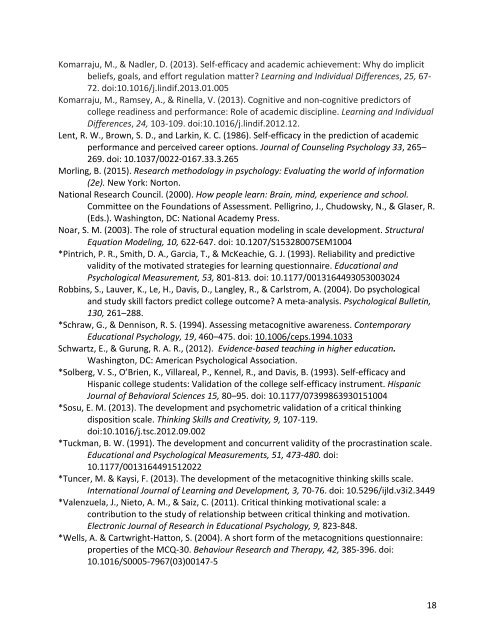A COMPENDIUM OF SCALES for use in the SCHOLARSHIP OF TEACHING AND LEARNING
compscalesstl
compscalesstl
You also want an ePaper? Increase the reach of your titles
YUMPU automatically turns print PDFs into web optimized ePapers that Google loves.
Komarraju, M., & Nadler, D. (2013). Self-efficacy and academic achievement: Why do implicit<br />
beliefs, goals, and ef<strong>for</strong>t regulation matter? Learn<strong>in</strong>g and Individual Differences, 25, 67-<br />
72. doi:10.1016/j.l<strong>in</strong>dif.2013.01.005<br />
Komarraju, M., Ramsey, A., & R<strong>in</strong>ella, V. (2013). Cognitive and non-cognitive predictors of<br />
college read<strong>in</strong>ess and per<strong>for</strong>mance: Role of academic discipl<strong>in</strong>e. Learn<strong>in</strong>g and Individual<br />
Differences, 24, 103-109. doi:10.1016/j.l<strong>in</strong>dif.2012.12.<br />
Lent, R. W., Brown, S. D., and Lark<strong>in</strong>, K. C. (1986). Self-efficacy <strong>in</strong> <strong>the</strong> prediction of academic<br />
per<strong>for</strong>mance and perceived career options. Journal of Counsel<strong>in</strong>g Psychology 33, 265–<br />
269. doi: 10.1037/0022-0167.33.3.265<br />
Morl<strong>in</strong>g, B. (2015). Research methodology <strong>in</strong> psychology: Evaluat<strong>in</strong>g <strong>the</strong> world of <strong>in</strong><strong>for</strong>mation<br />
(2e). New York: Norton.<br />
National Research Council. (2000). How people learn: Bra<strong>in</strong>, m<strong>in</strong>d, experience and school.<br />
Committee on <strong>the</strong> Foundations of Assessment. Pelligr<strong>in</strong>o, J., Chudowsky, N., & Glaser, R.<br />
(Eds.). Wash<strong>in</strong>gton, DC: National Academy Press.<br />
Noar, S. M. (2003). The role of structural equation model<strong>in</strong>g <strong>in</strong> scale development. Structural<br />
Equation Model<strong>in</strong>g, 10, 622-647. doi: 10.1207/S15328007SEM1004<br />
*P<strong>in</strong>trich, P. R., Smith, D. A., Garcia, T., & McKeachie, G. J. (1993). Reliability and predictive<br />
validity of <strong>the</strong> motivated strategies <strong>for</strong> learn<strong>in</strong>g questionnaire. Educational and<br />
Psychological Measurement, 53, 801-813. doi: 10.1177/0013164493053003024<br />
Robb<strong>in</strong>s, S., Lauver, K., Le, H., Davis, D., Langley, R., & Carlstrom, A. (2004). Do psychological<br />
and study skill factors predict college outcome? A meta-analysis. Psychological Bullet<strong>in</strong>,<br />
130, 261–288.<br />
*Schraw, G., & Dennison, R. S. (1994). Assess<strong>in</strong>g metacognitive awareness. Contemporary<br />
Educational Psychology, 19, 460–475. doi: 10.1006/ceps.1994.1033<br />
Schwartz, E., & Gurung, R. A. R., (2012). Evidence-based teach<strong>in</strong>g <strong>in</strong> higher education.<br />
Wash<strong>in</strong>gton, DC: American Psychological Association.<br />
*Solberg, V. S., O’Brien, K., Villareal, P., Kennel, R., and Davis, B. (1993). Self-efficacy and<br />
Hispanic college students: Validation of <strong>the</strong> college self-efficacy <strong>in</strong>strument. Hispanic<br />
Journal of Behavioral Sciences 15, 80–95. doi: 10.1177/07399863930151004<br />
*Sosu, E. M. (2013). The development and psychometric validation of a critical th<strong>in</strong>k<strong>in</strong>g<br />
disposition scale. Th<strong>in</strong>k<strong>in</strong>g Skills and Creativity, 9, 107-119.<br />
doi:10.1016/j.tsc.2012.09.002<br />
*Tuckman, B. W. (1991). The development and concurrent validity of <strong>the</strong> procrast<strong>in</strong>ation scale.<br />
Educational and Psychological Measurements, 51, 473-480. doi:<br />
10.1177/0013164491512022<br />
*Tuncer, M. & Kaysi, F. (2013). The development of <strong>the</strong> metacognitive th<strong>in</strong>k<strong>in</strong>g skills scale.<br />
International Journal of Learn<strong>in</strong>g and Development, 3, 70-76. doi: 10.5296/ijld.v3i2.3449<br />
*Valenzuela, J., Nieto, A. M., & Saiz, C. (2011). Critical th<strong>in</strong>k<strong>in</strong>g motivational scale: a<br />
contribution to <strong>the</strong> study of relationship between critical th<strong>in</strong>k<strong>in</strong>g and motivation.<br />
Electronic Journal of Research <strong>in</strong> Educational Psychology, 9, 823-848.<br />
*Wells, A. & Cartwright-Hatton, S. (2004). A short <strong>for</strong>m of <strong>the</strong> metacognitions questionnaire:<br />
properties of <strong>the</strong> MCQ-30. Behaviour Research and Therapy, 42, 385-396. doi:<br />
10.1016/S0005-7967(03)00147-5<br />
18


